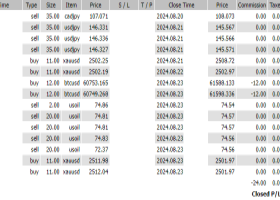Total Loss: -58,750 USD. Examining Market Reactions Post-Jackson Hole: Will Dollar Selling Really Continue?
Total Loss: -58,750 USD. Examining Market Reactions Post-Jackson Hole: Will Dollar Selling Really Continue?
1. Weekly Performance Review
The trading results from August 26 to August 30 ended with a significant loss of -58,750 USD. The strategy of targeting cross-yen, USD selling, and EUR selling did not yield successful outcomes, making it a challenging week overall. Following the Jackson Hole meeting last week, where Fed Chair Powell stated that "the time for rate cuts has come," it was anticipated that USD selling would intensify. However, the market's reaction suggested that this was "already priced in," leading to noticeable profit-taking and buybacks of the USD. Consequently, the dollar's recovery continued, and the market is expected to shift into a volatile range-bound trend going forward.
2. Points to Watch Moving Forward
① Focus on the Unemployment Rate as the Fed's Policy Shifts
September 6 and 18 have become crucial dates in U.S. monetary policy. On September 6, the U.S. employment report for August will be released, and on the 18th, the next FOMC meeting will take place. It is almost certain that the Fed will decide on a rate cut in September, but the focus will be on whether the cut will be 25 basis points or 50 basis points. Depending on the results of these events, the USD could experience significant movements, making it essential to pay close attention.
② Expected Rate Cuts by the Bank of Canada
Amid ongoing economic sluggishness in Canada, the Bank of Canada is expected to continue cutting rates. At next week's meeting, a standard 0.25% rate cut is anticipated, but there is also a slight possibility of a more substantial 0.50% cut. As a result, the Canadian dollar is likely to be viewed with a selling bias.
3. Key Points for Each Currency
-
USD (U.S. Dollar): Neutral to Sell
- USD/JPY is likely to be influenced by geopolitical risks and U.S. economic indicators. The focus will be on the extent of the rate cut at the September FOMC, which could cap the dollar's upside.
-
JPY (Japanese Yen): Neutral to Buy
- The yen is expected to react primarily to U.S. economic indicators and geopolitical risks. Demand for the yen as a safe-haven asset could increase if geopolitical risks intensify.
-
EUR (Euro): Neutral
- The euro is likely to be influenced by Eurozone economic indicators and developments in the Ukraine conflict.
-
AUD (Australian Dollar): Buy
- The Australian dollar is expected to remain strong, with the RBA's stance on high inflation continuing to support the currency amid rising expectations for a Fed rate cut.
-
NZD (New Zealand Dollar): Sell
- The New Zealand dollar is expected to face downward pressure due to the impact of the RBNZ's recent rate cut after four years.
-
ZAR (South African Rand): Neutral to Buy
- The South African rand is expected to be supported by lower U.S. interest rates and a robust stock market.
-
GBP (British Pound): Neutral
- The pound is likely to continue being influenced by the USD and JPY markets amid a lack of strong domestic drivers.
-
CAD (Canadian Dollar): Neutral to Sell
- The Canadian dollar is expected to face downward pressure as further rate cuts by the Bank of Canada are anticipated.
4. Reflections on the Arrest of Telegram CEO
On a personal note, I am paying close attention to the recent arrest of Telegram CEO Pavel Durov in France. I believe this incident is likely tied to the ongoing tensions between the West and Russia. The attempt by Telegram to circulate its own cryptocurrency, TON Coin, may also be a cause for concern among Western countries. I foresee the possibility of Telegram coming under Western regulation or even facing potential shutdowns.
Summary
While this week's trading ended in a loss, it is crucial to develop a solid strategy and approach the market with caution as we move into next week's key events. I will be particularly vigilant about the U.S. employment report and the Bank of Canada's decisions, ensuring not to miss any trading opportunities.
Closing Note
Thank you for reading this week's FX report. This time, I would like to talk about the recently trending "plant-based food." Plant-based foods are made primarily from plant-derived ingredients and are gaining global attention for their positive impacts on health and the environment.
Impact on Health
First, let's discuss the impact of plant-based foods on our health. Plant-based foods are rich in vitamins, minerals, and dietary fiber, which can help reduce the risk of lifestyle-related diseases such as heart disease and diabetes. A study by Harvard University (Harvard T.H. Chan School of Public Health, 2019) reported that people who primarily followed a plant-based diet had up to a 25% lower risk of heart disease.
Impact on Sexual Health
Plant-based foods are also expected to improve sexual health. For example, studies on erectile dysfunction (ED) have shown that plant-based diets can improve blood flow and vascular function, thereby enhancing sexual function (Journal of Urology, 2017). Saturated and trans fats, commonly found in animal-based foods, can constrict blood vessels, so consuming more plant-based foods can support better sexual health.
Improvement in Athletic Performance
Additionally, plant-based foods are believed to contribute to better athletic performance. Soy, legumes, and nuts contain high-quality protein that helps repair and grow muscles. A study by the American College of Sports Medicine (2018) reported that athletes who consumed plant-based protein showed superior strength and endurance. Plant-based foods also have anti-inflammatory effects, aiding in post-exercise recovery.
Weight Loss Benefits
Moreover, plant-based foods are effective for weight loss. These foods are generally low in calories and high in dietary fiber, which promotes satiety and helps prevent overeating. A study by The Lancet (2019) indicated that people who followed a plant-based diet found it easier to manage their weight and had a lower risk of obesity.
Impact on the Environment
Plant-based foods are not only good for our health but also for the environment. Producing meat requires significantly more water and energy than growing plants. A United Nations report (2020) suggested that choosing a plant-based diet can help curb global warming.
Plant-based foods have the potential to positively impact health, sexual health, athletic performance, weight loss, and environmental conservation. I encourage everyone to consider incorporating plant-based foods into their daily diet. I look forward to seeing you again in next week's FX report!


